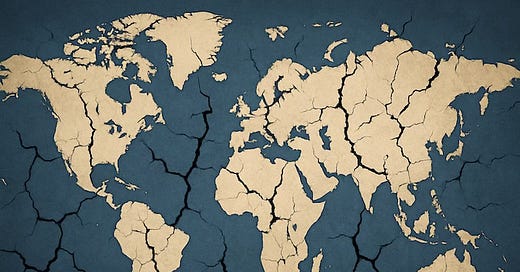The Rule-Based Order Is Cracking. The West Helped Break It
The West must acknowledge that legitimacy cannot be imposed; it must be earned.
For decades, Western leaders have invoked the "rule-based international order" as a guiding principle for global peace, security, and prosperity. Born from the ashes of World War II and nurtured through institutions such as the United Nations, the World Trade Organization, and the International Criminal Court, this order promised that power would be constrained by law, and that sovereignty, human rights, and collective responsibility would prevail over unilateral aggression.
But the rule-based order is faltering. And much of the damage is coming not from its enemies, but from its self-proclaimed guardians.
Gaza and the Erosion of Credibility
The West's response to Russia's 2022 invasion of Ukraine showcased the power of collective sanctions, diplomatic unity, and a global defence of sovereignty. Yet the same governments that decry Russian violations of international law are simultaneously undermining the very rules they claim to defend.
Take the ongoing war in Gaza. As of mid-2025, over 36,000 Palestinians have been killed, including thousands of women and children, during Israel's military operations, many of which have drawn condemnation from UN officials, human rights organizations, and legal scholars. Yet the United States continues to provide weapons, diplomatic cover, and financial support to Israel, even as the International Court of Justice has ruled that there is a plausible risk of genocide in Gaza. Rather than using its leverage to halt violations, the U.S. has vetoed multiple UN Security Council resolutions calling for a ceasefire.
This selective enforcement of international norms undermines the legitimacy of the entire system. It sends a clear message: the rules apply to adversaries, but not to allies.
Nuclear Hypocrisy: Israel and Iran
Nowhere is this double standard more evident than in the realm of nuclear nonproliferation. Iran, a signatory to the Nuclear Nonproliferation Treaty (NPT), has faced decades of inspections, sanctions, and military threats over its nuclear program, even while it insists its intentions are peaceful. Meanwhile, Israel, which is widely believed to possess at least 90 nuclear warheads, has never signed the NPT, has never opened its facilities to international inspections, and has faced no significant international pressure on this front.
The discrepancy is glaring. The NPT is the cornerstone of global nuclear restraint, and yet one of the Middle East's only nuclear powers operates entirely outside its framework, with U.S. backing.
Historical Precedents: Iraq and Beyond
The erosion of the rule-based order is not just a Middle Eastern issue. The U.S. invasion of Iraq in 2003, carried out without UN Security Council approval and justified on flawed intelligence, marked a seismic breach of international law. Subsequent Western interventions in Libya, Syria, and elsewhere have often skirted or ignored legal mandates, further weakening the legitimacy of multilateral norms.
A Growing Backlash from the Global South
Critics from the Global South have long pointed out these contradictions. Many African, Asian, and Latin American leaders view the rule-based order as a system that claims universality but operates through double standards. They are not wrong. When the institutions meant to constrain power instead become tools of it, trust erodes.
Source: El Fondo Centroamericano de Mujeres (FCAM)
Why the Rule-Based Order Still Matters
And yet, despite its flaws, the rule-based order remains the best framework humanity has devised for regulating international behaviour. It is imperfect, but the alternatives—unchecked militarism, transactional diplomacy, or great-power spheres of influence—are far worse.
Toward a Fairer System
What, then, must be done?
First, the rules must apply to everyone. That means holding allies to the same standards as adversaries. If international law is to mean anything, it must be enforced impartially—including in Gaza, including in Israel.
Second, institutions must be reformed to reflect today's realities. The UN Security Council, with its five permanent veto-wielding members, no longer represents the global balance of power. Expanding membership and limiting the use of the veto in humanitarian crises would bolster both effectiveness and legitimacy.
Third, accountability must be restored. From arms sales to war crimes investigations, the international community must be willing to confront violations regardless of who commits them. That includes major powers. No state should be above the law.
Rebuilding Trust and Legitimacy
Finally, the West must acknowledge that legitimacy cannot be imposed; it must be earned. That begins by listening to the grievances of the Global South, treating partners as equals, and building a system that reflects—not dictates—their aspirations.
This year, the United Nations is preparing to adopt the Pact for the Future, a sweeping commitment to revitalizing multilateralism, strengthening global solidarity, and restoring faith in international institutions. The pact calls for inclusive reforms to global governance, a recommitment to international law, and greater equity in decision-making. It is, in essence, an attempt to rescue the rule-based order from its own contradictions.
But the success of the Pact will hinge on whether powerful nations—especially in the West—are willing to move beyond rhetoric and apply the rules they advocate to themselves and their allies.
The rule-based order was never perfect. But in an era of rising authoritarianism, climate crisis, and technological disruption, the world cannot afford to abandon it. Instead, we must rebuild it—with fairness, with humility, and with the courage to apply its principles universally.
Otherwise, the rules will mean nothing. And the order will become just another word for power.
Top image courtesy ChatGPT






